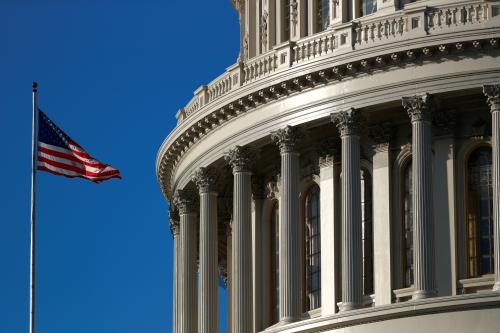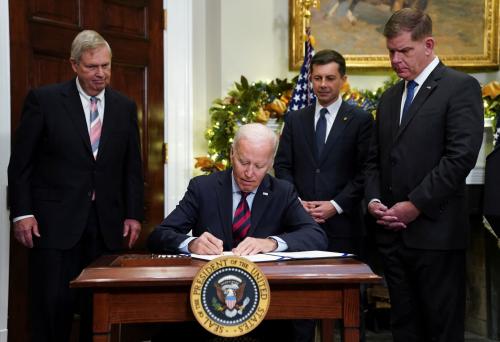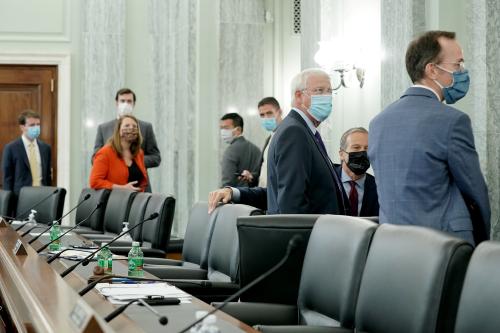This report is part of the Series on Regulatory Process and Perspective and was produced by the Brookings Center on Regulation and Markets.
Each day, thousands of in-house judges employed by federal administrative agencies hear and decide cases on questions such as whether to award disability benefits or whether polluters should pay fines. Debate has grown in recent years over the role and power of these “agency judges”—a group which encompasses administrative law judges, administrative judges, hearing officers, and others with similar titles—prompting proposals to reform how some are selected and supervised. We argue that a terminological preoccupation has led this debate to focus on the wrong group of agency judges.
In many ways, the debate over agency judges mirrors the larger debate over the administrative state. Among other things, critics have charged that agency judges have too much power and too little accountability, are overly favorable to their agencies at the expense of the public, and fail to provide rigorous examinations of the case before them. Supporters have responded that agency judges do a significant amount of work quite efficiently, synthesizing complex factual records and deciding many cases quickly. They argue that moving this work to Article III courts would impose important costs and delays on the public.
These debates are also vitally important to the legitimacy of the federal government. Agency judges are tasked with providing an initial independent review of the facts and law that are gathered and presented by their agencies and non-agency litigants. Thus, agency judges can provide important checks and balances within agencies. On an individual level, agency judges can leave a strong impression on those who appear before them.
Debates over agency judges frequently overlook their diverse roles across different agencies. Some agency judges decide whether to grant benefits to individuals. For instance, should applicants receive Social Security disability benefits? Other agency judges decide factually and legally complicated agency cases against sophisticated private actors. For instance, should a mortgage lender be fined for allegedly receiving illegal referral payments from mortgage insurers?
We argue that debates over agency judges, especially those concerning how agency judges are selected and supervised, are largely motivated by the subset of agency judges who preside over complicated and important cases. Yet while agency judges handle different issues at different agencies, these differences have been overlooked in most debates, which have instead focused primarily on the job title of agency judges. Reform debates should differentiate between those agency judges who preside over adversarial hearings[1], which tend to involve more complicated and important issues, and those agency judges who preside over inquisitorial hearings[2], which are often used to determine whether an individual receives benefits (for instance, hearings to determine whether a claimant receives Social Security disability benefits).
To that end, we propose reforming the standards for agency judges who preside over adversarial hearings in four areas: judicial qualifications, hiring procedures, impartiality requirements, and removal protections. Our reform proposals would do much to ensure that agency judges presiding over complicated and important cases are prepared to effectively decide cases shortly after taking office and remain fair in their decisions throughout their service.
Reform Proposals Should Focus on What Agency Judges Do, Not Titles
Unfortunately, current debates over agency judges privilege form over function. To be more specific, such debates generally turn on one particular job title of agency judges, “administrative law judges” or “ALJs.” Although Congress provided a number of important procedural safeguards for ALJ proceedings that do not apply in non-ALJ proceedings, it does not appear to have carefully considered when to require agencies to use ALJs. In many cases, laws are unclear as to whether ALJs are required. In some cases, agencies choose to employ ALJs when not required to do so by statute. In other cases, non-ALJs review the work of ALJs during the appeals process. In fact, the Administrative Conference expressed concern over this lack of uniformity in 1992.
As a result, there is great variation in the powers and responsibilities of ALJs. Almost 86 percent of all ALJs judges work for the Social Security Administration and preside over inquisitorial hearings to determine whether individuals receive program benefits. By the same token, many agency judges who are not administrative law judges preside over adversarial hearings. For instance, non-ALJs review decisions from the Department of Health and Human Services to deny grant applications. Non-ALJ’s decide whether to grant or deny patent applications. Non-ALJs at EPA make important decisions on environmental law violations. Non-ALJs actually review the decisions of ALJs in the Social Security Administration. In short, notwithstanding many people’s impression that ALJs are the most important kind of agency judge, non-ALJ’s hear many important cases.
Adversarial hearings tend to involve more complicated and broadly important public policy issues. They are more likely to involve important remedial powers such as the power to order redress, impose civil monetary penalties, or approve or revoke licenses. Debates over independence and impartiality issues are therefore generally quite salient for adversarial hearings. By contrast, non-adversarial hearings involve inquiring into case-specific facts and rendering a decision that rarely addresses an overarching public policy issue or sets an important legal precedent. Partially for this reason, many inquisitorial hearings do not culminate in a published opinion (for instance, Social Security ALJs who decide to grant disability benefits are not required to publish an opinion).
We believe our reform proposals are most sensible in the adversarial context. The reform proposals outlined below are likely to entail cost for agencies, which face limited resources. Not only do we believe these costs are more easily justified for the agency judges that decide the more consequential and precedent-setting cases, but agencies with adversarial hearings tend to hire fewer judges than those with inquisitorial hearings, resulting in lower overall cost increases. Some of our proposals, such as a revolving door prohibition, may also make agency judge positions less attractive to some qualified candidates. We believe this is less likely to be a problem for agency judge positions that decide the more prestigious adversarial cases. Similarly, candidates who meet the qualification requirements that we propose are more likely to be attracted to those agency judge positions which involve presiding over adversarial hearings.
A Proposal for Selecting and Maintaining Qualified Adversarial Judges
Although many of the recent reform proposals have erred in applying solely to ALJs or non-ALJs, regardless of whether the judge presides over an adversarial or inquisitorial hearing, many worthwhile ideas can be gleaned from them. Some urge agencies to issue minimum qualifications and selection criteria for agency judges and follow set policies for their selection. Others urge more specific criteria, including impartiality, appropriate temperament, and the ability to clearly communicate decisions. Still others urge agencies to establish screening and interview panels. The Office of Personnel Management also recently proposed new regulations to remove the applicability of civil service hiring rules to particular agency judges.
Our proposal takes the best elements of these plans and applies them specifically to the activities and responsibilities of adversarial agency judges.
We believe that judges with independence and impartiality, subject matter expertise, and litigation or adjudication experience are the cornerstone of any agency judicial system. Judges must possess all three of these qualities to foster not only fairness but also the perception of fairness. Recently, for example, the Secretary of the Interior appointed several individuals with backgrounds in conservative and Republican politics, including one who served in political (i.e., non-career) appointments in government immediately prior. Although these individuals have subject matter expertise, the process by which they were selected raises significant concerns about their impartiality. Litigants must know they are getting a fair shake, lest trust in government and the administrative state erode.
We therefore propose that Congress reform the laws governing adversarial agency judges in four specific areas: judicial qualifications, hiring procedures, revolving door prohibitions, and removal protections.
- Judicial qualifications: Given the nature of adversarial adjudications, we believe potential agency judges should have some minimum number of years of litigation or adjudication experience, as well as some minimum number of years of practice in their agency’s substantive area of law. Prior to 2018, administrative law judges were required to have at least seven years of litigation experience working on procedurally equivalent hearings in order to ensure they could efficiently and effectively manage hearings. We agree with this requirement, though there is nothing magical about the number seven. Agency judges must have significant experience with litigation upon taking the bench, as high-impact cases may turn on procedural decisions, and an erroneous ruling may result in a case being overturned on appeal or subject to further litigation.
However, litigation experience is by itself insufficient to ensure agency judges can effectively manage cases, and these judges should also have competency in their agency’s substantive area of law. Unlike Article III judges, who are called upon to adjudicate on many legal topics, agencies have the privilege of selecting judges with subject matter expertise, and doing so provides two primary benefits: Agency judges with a thorough knowledge of the subject matter can more promptly resolve complicated cases and can ensure their decisions are not overturned on appeal.
- Hiring procedures: Several states allow governors to appoint as judges only those individuals whose names have been put forth by bipartisan, non-partisan, or expert panels. These panels are not a panacea for all of the ills plaguing judicial selection, but they can remove some of the politics surrounding nominations and increase diversity (including racial, gender, and ideological diversity) on the courts. We believe they provide a good model for selecting agency judges. We propose that each agency that hires agency judges should have a multi-member panel that is made up of representatives from the general public, the plaintiff’s bar, and defense bar, with an equal number of members from the Democratic and Republican Parties and with independents providing tie-breaking votes. The members would be selected by the head of the agency, have staggered terms, and have “good cause” removal protection. Agency officials would not be eligible to serve on panels. For each agency judge vacancy, this panel would review applications and select three names[3] to submit to the agency head, who could select one for the opening, or request three new names. This selection process would encourage interest groups to find and propose neutral arbiters, of which the agency head must select one.
- Revolving door prohibition: We believe that the panel proposal above would help ensure that agency judges are unbiased in their decisions, but additional policies should be put in place to ensure judges are not influenced by their personal interest. To that end, we propose three restrictions to limit the influence of the revolving door. First, agency judges should be prohibited from adjudicating cases involving former employers or matters on which they previously worked for two years. Second, agency judges should be prohibited from going to work for parties appearing before the judge for two years after leaving the agency. Third, agency judges should not be permitted to maintain outside employment or engage in consulting while employed as a judge. Further, each of these policies would come with civil and criminal penalties for violations. Together, these policies would help ensure that agency adjudicators do not make rulings for the purpose of rewarding a prior employer or benefiting a prospective one.
Removal protections: Finally, agency judges must be ensured independence throughout their tenure. All agency judges should be provided “good cause” removal protections, allowing them to be removed only for neglect of duty, malfeasance, abuse of authority, inefficiency, or some other enumerated circumstances. Such a provision would ensure that agency judges would not feel, let alone be, pressured into adjudicating cases to favor a particular outcome.
Each agency’s judicial system has different needs or legal requirements, and as such it is difficult to generalize across the government. A reasonable argument can be made that procedures governing agency judges should be left to the discretion of individual agencies. However, we think the above provisions would help ensure that agency judges throughout the federal government can effectively adjudicate cases upon taking the bench and remain impartial through their term on the bench.
Constitutional Objections
In Lucia v. SEC (2018), the Supreme Court ruled many agencies’ procedures for hiring ALJs unconstitutional. We are therefore cognizant that any reforms of agency judge hiring will be reviewed with an eye toward constitutionality. We believe our proposals are all consistent with the Appointments Clause.
The Supreme Court held in Lucia that the Constitution requires at least some ALJs to be appointed by the head of the agency rather than subordinates, given the ALJs’ responsibilities and duties. The Court has consistently held, however, that laws may restrict who can be selected to fill particular positions. As far back as 1926, the Court held in Myers v. United States that Congress may place qualifications on individuals the President could appoint to hold particular positions. Further, the Supreme Court has twice upheld statutes that require the President to select an appointee from a list of names, provided separation of powers concerns are properly addressed. If Congress’s placement of such limits on the President is constitutional, we believe our proposals to require judicial qualifications and panel nominations are constitutional as well.
We also believe that our proposed removal protections do not violate the Constitution’s Vesting Clause, even in independent agencies. The Supreme Court’s Morrison v. Olson decision reiterated the constitutionality of “good cause” removal protections of inferior officers who report to “at will” officers; such protections for agency judges in executive agencies should be undoubtedly constitutional. And although Free Enterprise Fund v. PCAOB struck down so-called “double good cause” protections for some positions in independent agencies, the Court in Lucia explicitly refused to similarly find such double-layered removal protections for the SEC’s judges unconstitutional. As such, current case law provides that “good cause” protections for agency judges in both executive and independent agencies are constitutional, and to the extent that there may be an open question, we believe the lack of a firm answer from the Supreme Court should be no reason not to enact these necessary protections.
Conclusions
Debates over how to reform the selection and supervision of agency judges should focus on judges who preside over adversarial hearings, which generally involve more complicated and salient issues. Agency judges who preside over adversarial hearings must be independent and impartial, have subject matter expertise, and hold litigation or adjudication experience. To this end, we propose reforming the standards for these agency judges in four areas: judicial qualifications, hiring procedures, impartiality requirements, and removal protections. We believe adopting these proposals would result in a more capable and unbiased administrative judicial system, helping to bolster the legitimacy and efficiency of an important part of the administrative state.
The SEC disclaims responsibility for any private publication or statement of any SEC employee or Commissioner. FDIC also disclaims responsibility for any private publication or statement of any FDIC employee. The Article expresses the authors’ views and does not necessarily reflect those of the Commission, FDIC, or other members of the staff.
The authors did not receive any financial support from any firm or person for this article or from any firm or person with a financial or political interest in this article. They are currently not an officer, director, or board member of any organization with an interest in this article.






